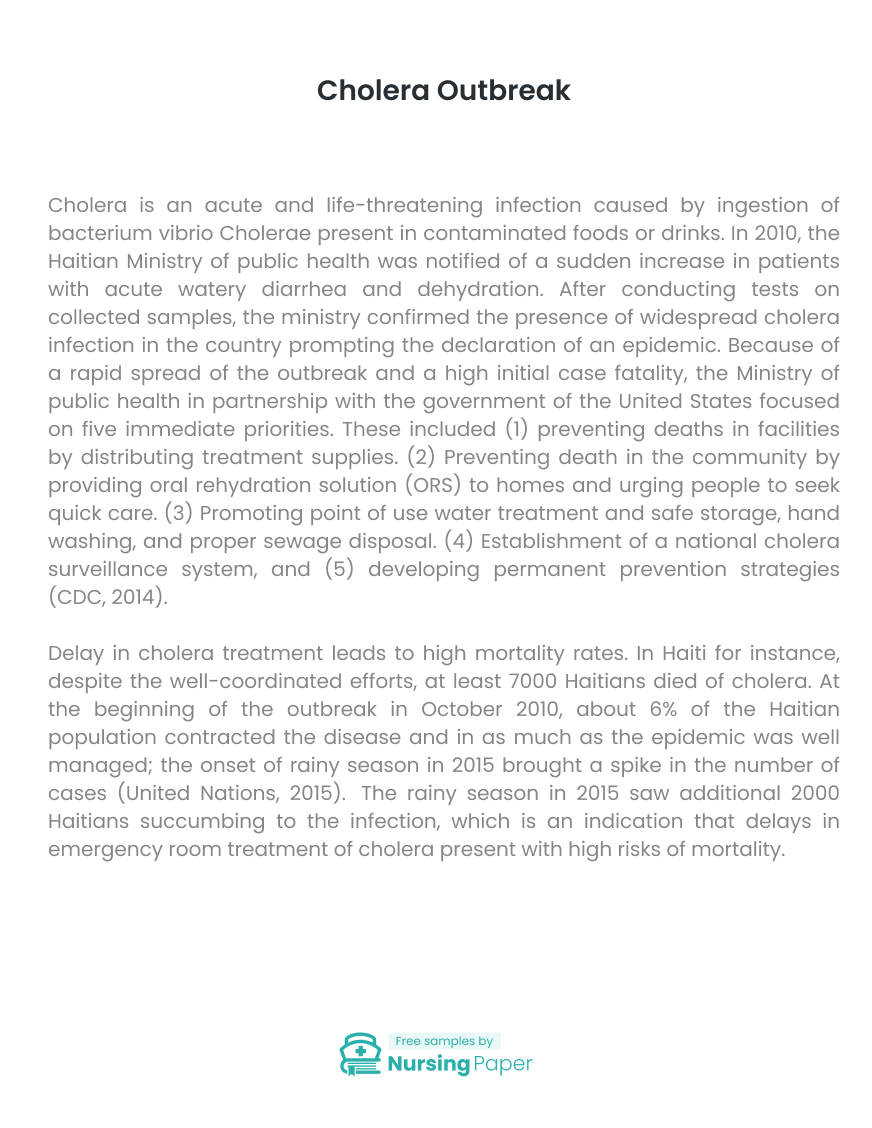
Cholera Outbreak
Introduction
Cholera is an acute and life-threatening infection caused by ingestion of bacterium vibrio Cholerae present in contaminated foods or drinks. In 2010, the Haitian Ministry of public health was notified of a sudden increase in patients with acute watery diarrhea and dehydration. After conducting tests on collected samples, the ministry confirmed the presence of widespread cholera infection in the country prompting the declaration of an epidemic. Because of a rapid spread of the outbreak and a high initial case fatality, the Ministry of public health in partnership with the government of the United States focused on five immediate priorities. These included (1) preventing deaths in facilities by distributing treatment supplies. (2) Preventing death in the community by providing oral rehydration solution (ORS) to homes and urging people to seek quick care. (3) Promoting point of use water treatment and safe storage, hand washing, and proper sewage disposal. (4) Establishment of a national cholera surveillance system, and (5) developing permanent prevention strategies (CDC, 2014).
Delay in cholera treatment leads to high mortality rates. In Haiti for instance, despite the well-coordinated efforts, at least 7000 Haitians died of cholera. At the beginning of the outbreak in October 2010, about 6% of the Haitian population contracted the disease and in as much as the epidemic was well managed; the onset of rainy season in 2015 brought a spike in the number of cases (United Nations, 2015). The rainy season in 2015 saw additional 2000 Haitians succumbing to the infection, which is an indication that delays in emergency room treatment of cholera present with high risks of mortality.


1. CDC. (2014). 2010 Haiti Cholera Outbreak & CDC Response. Retrieved from: https://www.cdc.gov/cholera/haiti/2010-outbreak-response.html
2. United Nations. (2015). Haiti Cholera Response: United Nations in Haiti Year-End Update January – December 2014. Retrieved from: http://www.un.org/News/dh/infocus/haiti/Cholera_UN_Factsheet_January_2015.pdf



The download will start shortly.

The download will start shortly.
 Subject:
Health and Social Care
Subject:
Health and Social Care  Number of pages: 7
Number of pages: 7  Subject:
Health and Social Care
Subject:
Health and Social Care  Number of pages: 5
Number of pages: 5  Subject:
Medicine
Subject:
Medicine  Number of pages: 11
Number of pages: 11  Subject:
Health and Social Care
Subject:
Health and Social Care  Number of pages: 3
Number of pages: 3  Subject:
Medicine
Subject:
Medicine  Number of pages: 4
Number of pages: 4  Subject:
Health and Social Care
Subject:
Health and Social Care  Number of pages: 2
Number of pages: 2  Subject:
Health and Social Care
Subject:
Health and Social Care  Number of pages: 5
Number of pages: 5  Subject:
Nursing
Subject:
Nursing  Number of pages: 3
Number of pages: 3  Subject:
Health and Social Care
Subject:
Health and Social Care  Number of pages: 2
Number of pages: 2  Subject:
Health and Social Care
Subject:
Health and Social Care  Number of pages: 3
Number of pages: 3  Subject:
Medicine
Subject:
Medicine  Number of pages: 2
Number of pages: 2  Subject:
Health and Social Care
Subject:
Health and Social Care  Number of pages: 2
Number of pages: 2  Subject:
Medicine
Subject:
Medicine  Number of pages: 5
Number of pages: 5  Subject:
Health and Social Care
Subject:
Health and Social Care  Number of pages: 2
Number of pages: 2  Subject:
Health and Social Care
Subject:
Health and Social Care  Number of pages: 3
Number of pages: 3 
